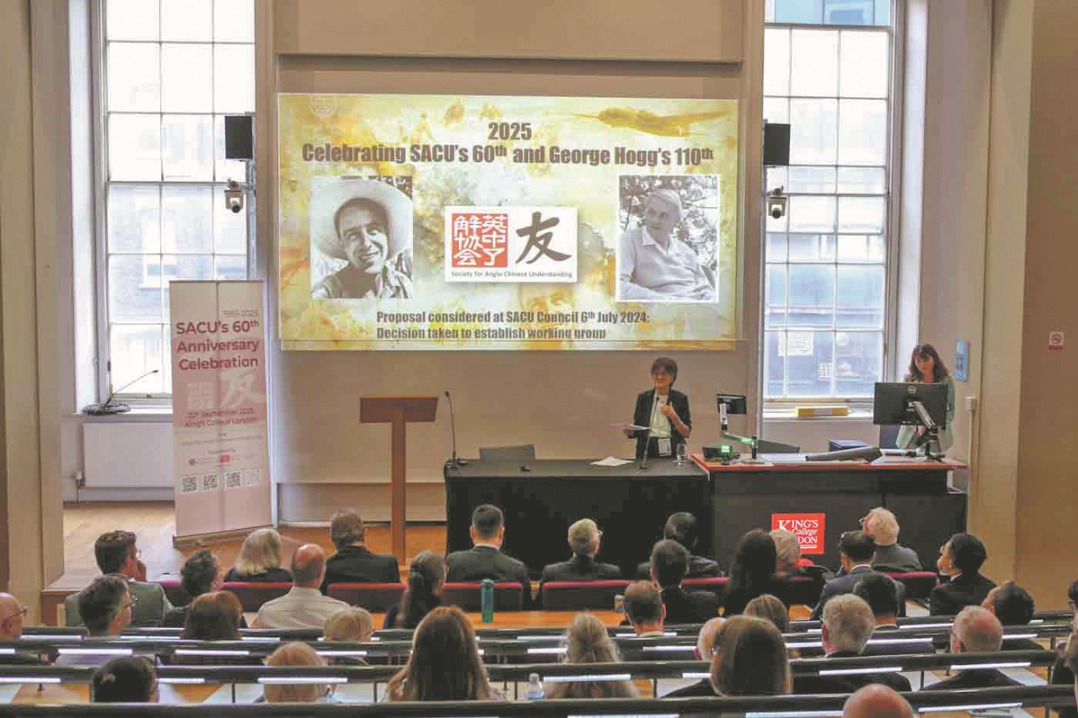Students seek a higher degree of love
Survey shows they are adapting traditional ideas of marriage and children to suit modern times. Wang Xiaoyu reports.

Zeng Jiru, a graduate student studying politics and international relations at Peking University, is not sure if he'll ever marry, let alone have children.
His father got married when he was 23. "My dad believes that tying the knot is something everyone must do in their lifetime. I don't much care and would rather remain single than rush into marriage," Zeng said.
He added that his desire to start a family might grow stronger after graduation, when he becomes more distant from the professors and classmates he can call upon for support now. "Also, my girlfriend's opinion matters a lot," he said.
Zeng's perspective on marriage is emblematic of China's Generation Z, broadly defined as those born between 1995 and 2010.
According to a report released in April by the Population Development Studies Center at the Renmin University of China, marriage and childbearing have retained their appeal among college students, but their attraction lies mainly in emotional, rather than financial, benefits.
Changing perceptions
The report, conducted in November and December, surveyed 9,800 students pursuing undergraduate, graduate or doctoral degrees, with the average age of respondents being 20.3 years.
"The fundamental value of marriage and family has changed in the eyes of college students. Instead of seeing it as a source of financial security, they expect marriage to provide emotional and spiritual satisfaction," Li Ting, a professor at the center and one of the researchers in the survey, said.
"For the rest of society and policymakers, it is time to break away from old social stigmas and adapt to new trends among the young."
Marriage and birthrates have been declining in China for years.
Official data show that about 7.64 million marriages were registered last year, down from about 8.1 million in 2020 and the lowest figure in more than three decades.
The number of newborns also fell to 10.62 million, compared with 12 million the previous year.
Whether these declines will continue in the future has been the subject of much discussion as China's Generation Z approaches the traditional age for marriage, ranging from the late 20s to early 30s.
According to the survey, 61 percent of college students were certain that they would get married, with only 4 percent rejecting the possibility completely. Their ideal age for marriage averaged 27.8 years and the ideal number of children was 1.85.
The results came as a surprise to researchers, who have long believed that the rise of people who wish to remain single and DINK (Double Income No Kids) families in China will further dampen younger people's enthusiasm for having a family.
"I think certain aspects of traditional Chinese culture, such as interdependence between family members, still have a strong impact," Li said. "The younger generation's yearning for marriage is still evident."
Conventions lose ground
But some conventions, such as getting married in order to perpetuate the family line, have become less popular.
The report showed that nearly 90 percent of those surveyed thought that they would get married for accompany and emotional stability, with less than 30 percent saying they sought financial security from marriage.
In terms of childbearing, most respondents agreed strongly with the perception that raising a child is important and meaningful, and that a baby can be a source of happiness. Fewer cared about their child's role in taking care of them later in life.
"The saying 'Raise children to support yourself in your old age' sounds absurd to me," said An Xinxin, a sophomore studying finance at the University of International Business and Economics in Beijing.
"If I need some assurance about how I'll be looked after when I'm old, it would be better to buy more insurance."
Li said: "They (college students) engage in romantic relationships to find a partner to grow old and work toward important goals with. They want to get married to have someone to talk to and as an emotional buttress at home. They want to have a baby as a supplement to their growth and to help nurture their marital relationship.
"The functional value of marriage and childbearing is gradually being replaced by its emotional value, and self-worth is given great significance these days."
Another major finding was that the costs of housing and raising children are among the biggest concerns for Generation Z.
"There is also a gender distinction," Li said, adding that while men were the most worried about buying a new home and betrothal gifts, women voiced deeper misgivings about encountering hurdles in their career advancement.
Yuan Xin, deputy president of the China Population Association and a professor at Nankai University in Tianjin, said that in recent years, the participation of women in the workforce has become the norm in China, but women still shoulder the bulk of responsibility in the private domain, such as household chores and taking care of the children.
"No doubt they are under a lot of pressure," he said.
New approach urged
As China rolls out a series of supportive measures to encourage births and facilitate the implementation of the third-child policy, experts said that it is essential for new measures to tackle the concerns of both genders.
"In addition to lowering the costs of marriage and raising children, which primarily affect men, we should also respond to the career aspirations of women through measures such as improving nursery care," Li said.
"It is pointless to try to force young people to get married and have children. The rest of society needs to be patient and try to understand their views."
Yu Jia, an associate professor at Peking University's Center for Social Research who was not involved in the study, said it will take time for young people to adapt to the third-child policy.
In late 2015, China allowed all couples to have two children, after operating the strict family planning policy for more than three decades. The third-child policy was introduced in May last year.
The Renmin University report showed that less than 2 percent of those surveyed were interested in having three or more children.
"The speed with which China has shifted family planning regulations has been rapid. Many young people have probably never seen a family with three children, and they do not view it as a viable choice at all," Yu said.
"But as they age, their perspective will likely change and may lean toward having more children if appropriate policies are in place to foster such a trend."





Today's Top News
- China, ASEAN sign FTA 3.0 Upgrade Protocol
- Judicial reforms strengthen China's maritime rule of law
- Li calls for enhanced regional growth, peace
- Beijing's remarkable journey from thirst to flow
- Eighty years on, Taiwan's future still lies in reunification
- Nation set to cultivate new growth drivers






























